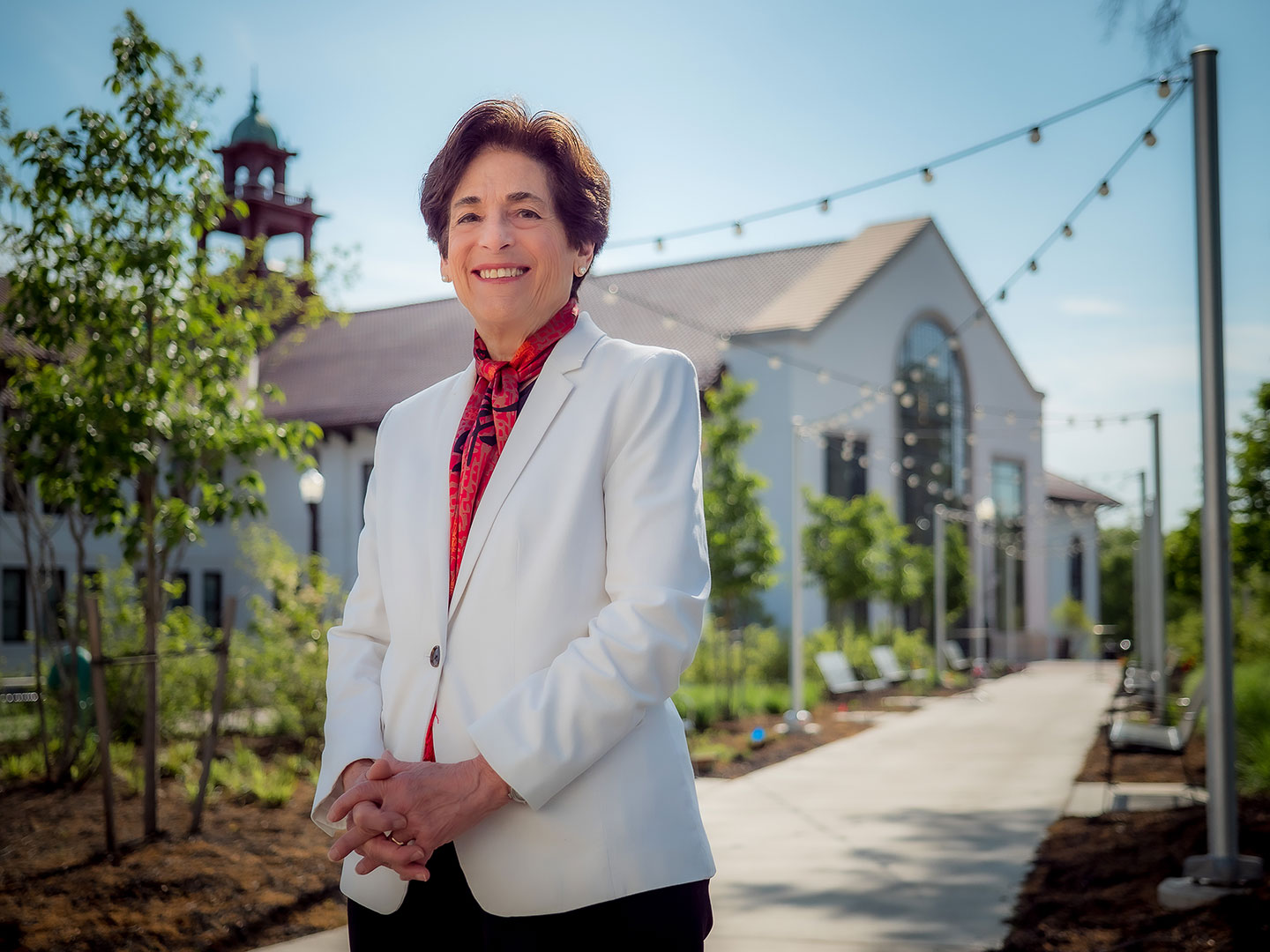
The Cole Years
Reflecting on the
transformation
of the University
during President
Susan A. Cole’s
23 years
Before becoming a builder of universities, Susan A. Cole, as a child of Brooklyn, dreamed of a life on the wild frontier. World-famous sharpshooter Annie Oakley was her hero, “and I inhabited her persona for dear life,” Cole says, “capturing the bad guys, bringing justice to the world, acting bravely, doing things.”
The Montclair State University president has been reflecting on her life story and career, from make-believe-cowgirl to playwright to academic, as the curtain draws to a close on a remarkable tenure. It’s a history marked by its boldness of vision for students and its principled response to the urgent issues of the times. Always a natural leader – as evidenced by her very first preschool report card that read: “Susan is the leader in her group. She is the driving force of everything that kids do.” – she grew up determined to make her place in the world and to make the world a better place.
For the past 23 years as Montclair State’s president, Cole has drawn on her vision, “ridiculous optimism” and the help of dedicated faculty, administrators and staff, to write a new narrative for the University, transforming it from a respectable regional school to an ambitious national research university with the state’s second largest enrollment.
The transformation is seen everywhere: in the growth of academic and research programs, the building of outstanding new facilities and the renovation of existing buildings, the nearly doubling of the student body, the hiring of hundreds of talented new faculty, the burnishing of Montclair State’s reputation and much more. “It’s a phenomenal narrative that she built year after year,” says University Trustee and Foundation Board member, Rose Cali ’80.
In reflecting on that narrative, Karen L. Pennington, who recently retired as vice president for Student Development and Campus Life after more than two decades, says Cole “has told a tale that people read and followed to be able to fulfill that dream that she was creating for all of us. She brought us all into the play and made us all part of that cast of characters to complete the show.”
“The work that we accomplished together, the things we have built and grown constitute a transformation of Montclair State that is nothing short of miraculous,” Cole said in her fall 2020 address to the University.
The efforts not only elevated Montclair State University’s reputation, they provided tens of thousands of students with an affordable quality education that gave many graduates opportunities they might not otherwise have had.
In an interview with Montclair magazine, Cole said Montclair State, a fledgling university when she arrived, was already “a good institution and had been for many years. But there’s no question, we have transformed the institution. It has been major, rapid for higher education, and profound.”
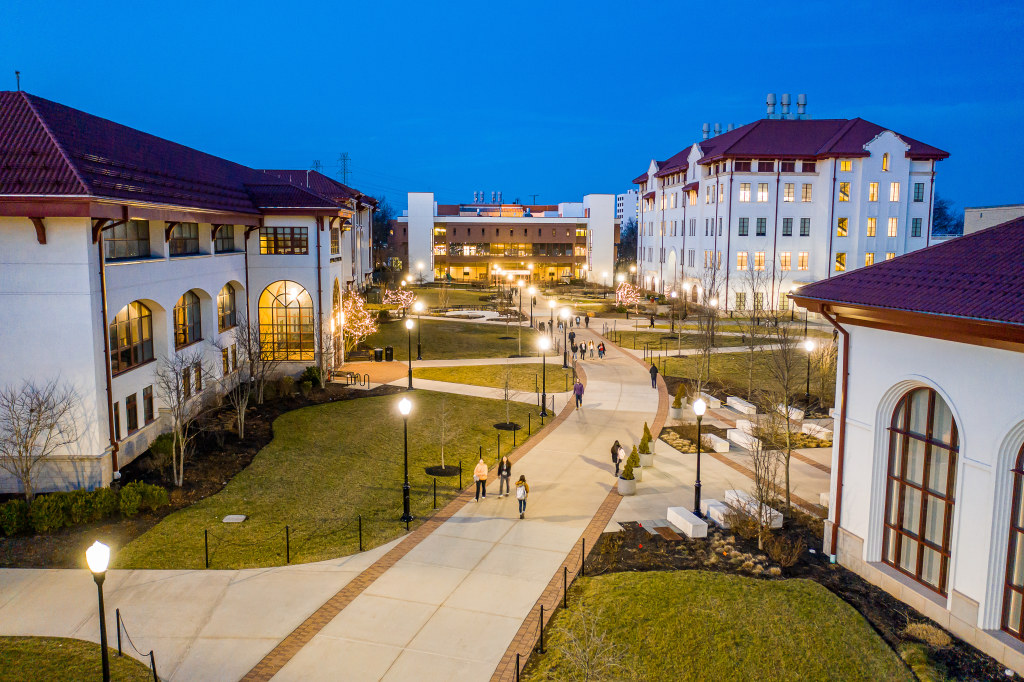
Notes Pennington: “Dr. Cole recognized early on that we had potential that was not being reached, whether it was because of the numbers of students we were serving, the faculty that could be here, the research that could be done.”
Seeing Untapped Potential
Montclair State had been advanced from college to university status just a few years before Cole became the first woman to lead the University in 1998. In her inaugural address, she said, “The important question is never ever what we want for the moment, but what we, as individuals and as a collective community, want to have accomplished at the end of our working lives; where, for example, we want this university to stand in 50 years’ time; the impact we wish to have made on the progress of society.”
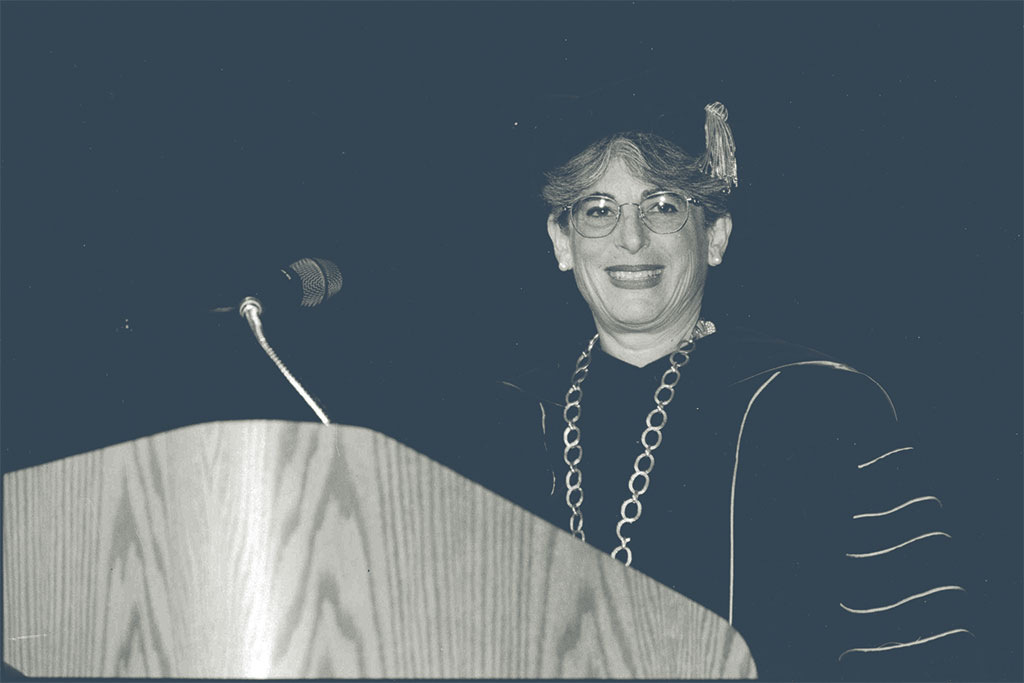
The pace of growth over the past 23 years, including the creation of a number of important research centers and institutes and the addition of four new schools and colleges, was meaningful for those working alongside Cole to make it happen.
“To be there as it was happening was one of the most exciting times of my life,” says Bertha Diggs, who retired in 2018 as the associate director of the Educational Opportunity Fund (EOF) program. “Even when we were going through growing pains ... there was something about the atmosphere and the aura. The tone was set by a president who had direction, who knew that the University could be great by moving in certain directions.”
Those directions include using public-private partnerships to help fund major construction and renovation projects that included more than 3 million square feet of technologically advanced labs and classrooms, two new theaters and an art gallery, the Red Hawk Diner, two parking decks, a train station and a smart energy system that – even with all the new facilities – has reduced the University’s carbon footprint by an estimated 40%.
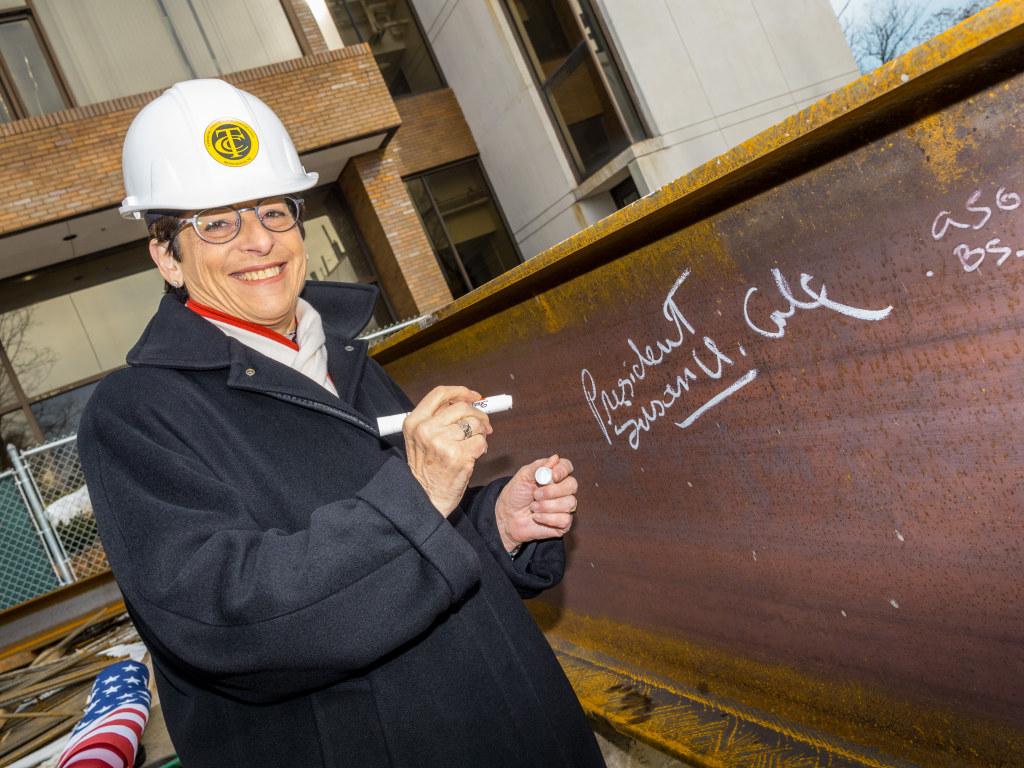
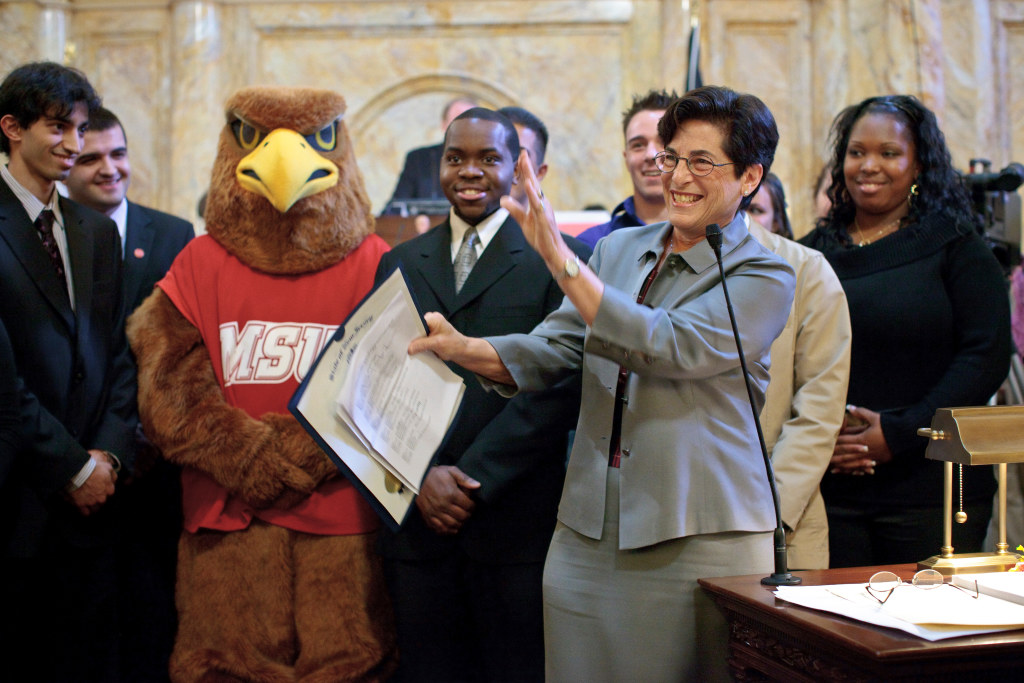
“She’s a force of nature,” says Ralph LaRossa, president and chief operating officer of PSE&G Power, and a member of the University’s Board of Trustees.
“I think the buildings are symbolic of everything else that happened,” LaRossa says. “Even in the changes that were made to the buildings, she kept the tie to the old by making sure it was that same vintage building, the same Mission Revival architecture that was put in place from the beginning.”
But the buildings are just a part of the story. Cole elevated the visibility of the University within the state, the region and the nation. She increased enrollment, enhancing diversity and quality, and increased the institution’s revenue streams from external sources, including non-state resources.
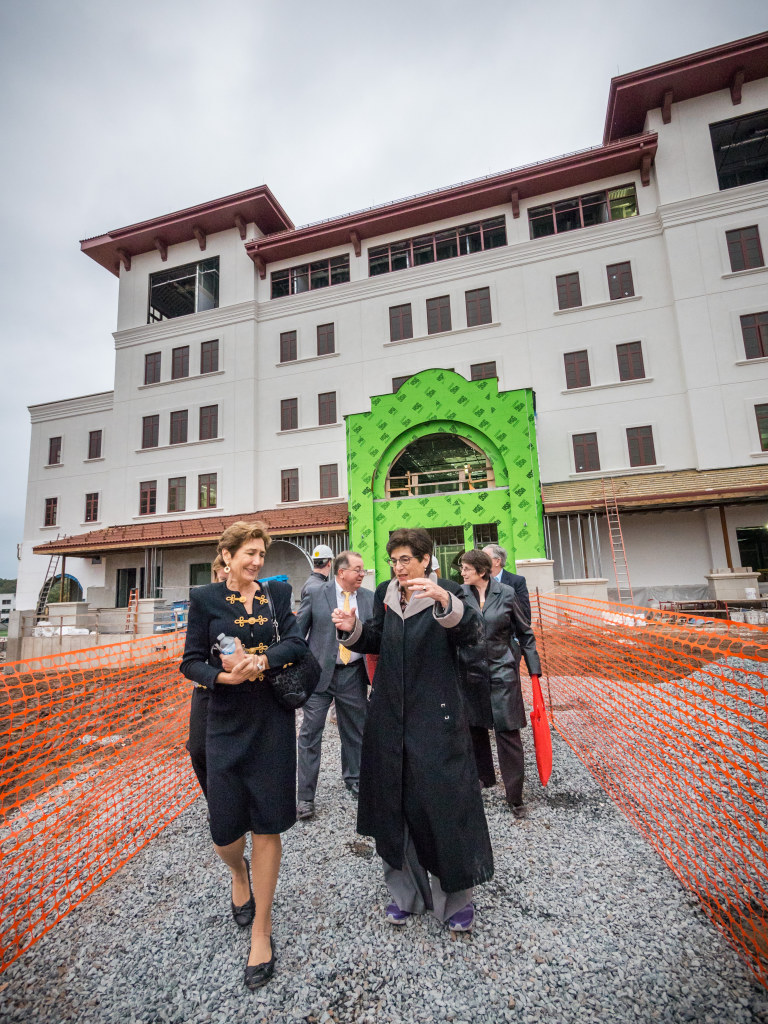
“She was the first college president I think who really understood the legislative process in New Jersey, the cast of characters, I say lovingly, and who they are in New Jersey,” says New Jersey Senate Majority Leader Loretta Weinberg (D-37). “She used every opportunity to move the University forward.”
In talking about her connections with Montclair State during her own remarkable 30-year career, Senator Weinberg, who is also retiring at the end of 2021, recalls how Cole provided a life highlight: dinner with Ruth Bader Ginsburg after a performance by the late Supreme Court Justice’s grandson in The Merchant of Venice at the Alexander Kasser Theater. “Susan, never one to let an event go by without adding to some positive reaction to it, arranged for a one-on-one,” Weinberg says. “She found ways to feature Montclair State University in whatever was happening.”
“As Montclair State University continues to grow, it will be Dr. Susan Cole’s vision and legacy that laid the foundation for the University’s success in the years to come.”
‘Do Right by the World’
Susan Ablon Cole, the daughter of immigrant parents, her mother from Russia and her father from Ukraine, grew up in New York City’s Brooklyn Heights neighborhood.
“All my life, I have been driven by a sense of obligation to do right by the world, and I think that is because my parents and their friends talked about it all the time. They had endured enormous struggles, and they were engaged in making a life in a new country, making a life for their children,” Cole says during an interview. “They cared about issues, and I listened and I absorbed all of that. I absorbed it with the expectations and the hope that they had for building a life in which they could be free, in which they could live and contribute. It became part of who I was.”
During the 2021 spring semester, Heather Buchanan, professor in the John J. Cali School of Music, invited Cole to speak virtually with 130 students as part of the Cali School Masterful Musings series. Cole talked about her early life, about Annie Oakley, and about her own musical beginnings as a member of a choir that met every Wednesday afternoon in Brooklyn Heights. A rehearsal of the choir is captured in the film, When We Grow Up, with the children directed by the blacklisted composer Earl Robinson. Susan Cole, a girl with braids in the back row between Boy Scouts, sings and dances.
“When she says her line about adults not being any fun, that’s when I realized the die was cast pretty early on,” says Buchanan. “I’m guessing she was no more than 12 and I just thought, even back then, she was pretty darn serious. She wasn’t mucking around.”
“She built the buildings but more importantly she transformed the student population.”
As for her cowgirl dreams, to this day, “Annie Oakley is so much a part of her,” observes Pennington. “It’s the maverick, it’s the fearless, the going out there and being out on a limb and charging ahead and not worrying about the obstacles that are in your way, and when you find those obstacles, taking them down.”
Diversity: A Matter of Personal Morality
One of Cole’s goals was for Montclair State’s student body to reflect the diversity of New Jersey. And it does. Representing virtually every demographic and socioeconomic group, from big cities and small towns, students arrive at a campus that seeks to make everyone feel included and welcomed.
“The soul of this university, the very sacred purpose of this university is to create itself as a place where all of our students have the opportunity to fulfill their potential,” Cole told students in a video address in June 2020.
Over several decades, Montclair State has worked to broaden the diversity of its student population so that it reflects the rich diversity of New Jersey. Cole built on these efforts and expanded them in several notable ways, including creating the President’s Commission on Affirmative Action, Equal Opportunity and Diversity as a vehicle for engaging faculty and staff more closely in the work of diversity and inclusion.
“Dr. Cole expanded the student body in ways that had not been considered,” says Associate Dean Leslie Wilson of the College of Humanities and Social Sciences. “Our student body became more economically diverse. It became more racially diverse. It became more socially diverse. It became more culturally diverse. She built the buildings but more importantly she transformed the student population. People who would never have considered applying to Montclair State before do apply now because Montclair State makes them feel comfortable and welcome, and that’s important.”
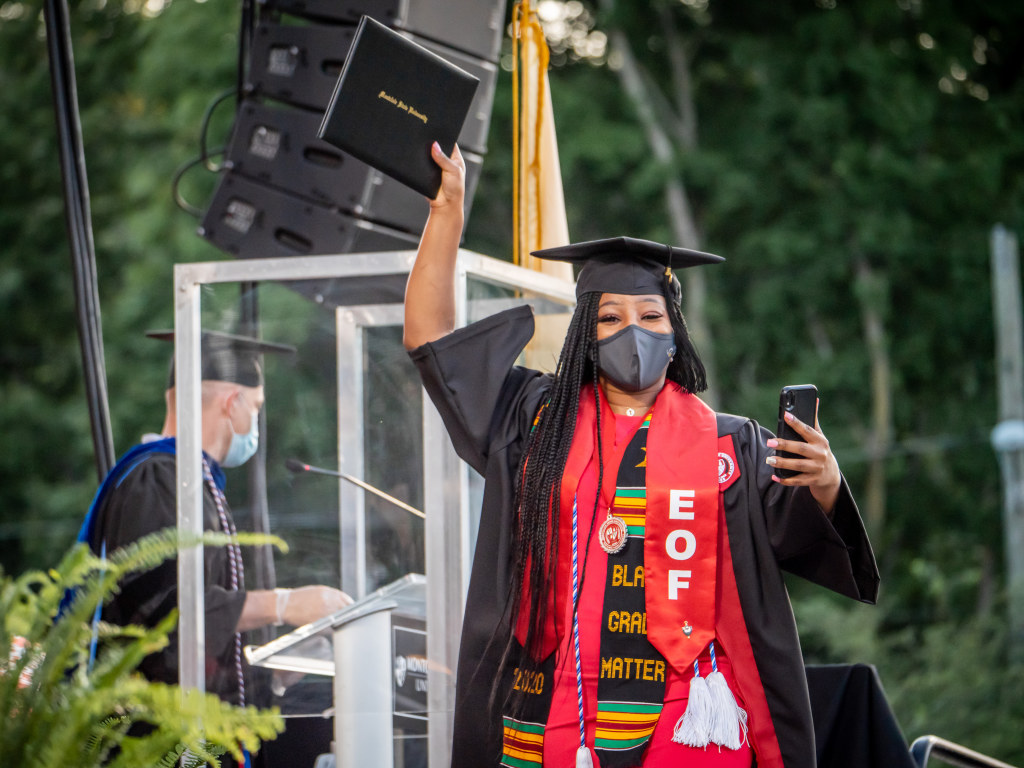
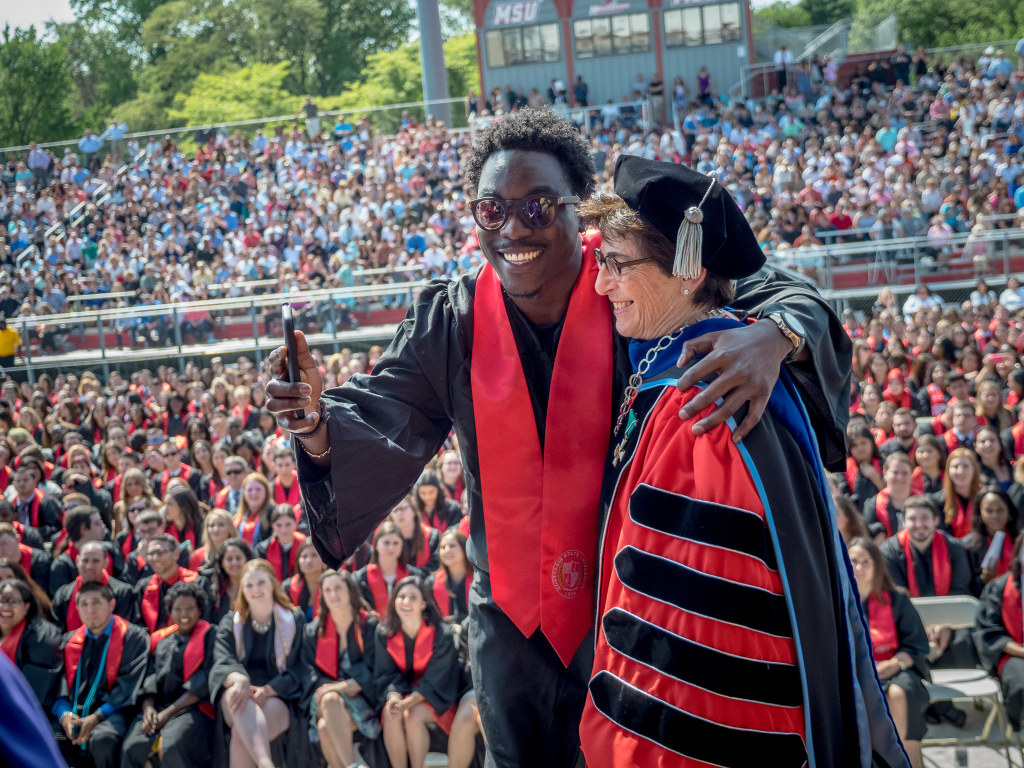
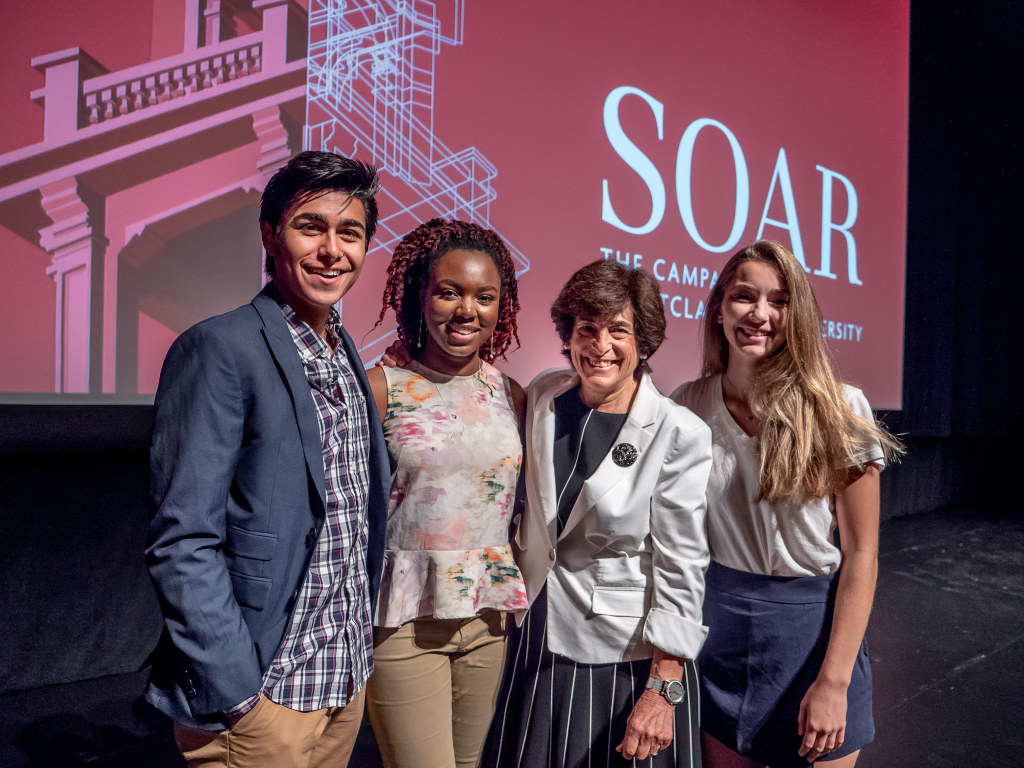
The U.S. Education Trust describes Montclair State as a “Top Gap Closer” for increasing graduation rates for minority students, and the University, as a Hispanic-Serving Institution, enrolls more Latinx undergraduates than any other New Jersey higher education institution. It is recognized as one of the Top 100 Colleges for Hispanics each year for the past 18 years by Hispanic Outlook on Education magazine.
“A byword that she would always bring into every meeting that we had was retention, not just enrollment, but retention and graduation.”
In her EOF work with students from some of the state’s most impoverished communities, Diggs says that under Cole there was emphasis on achievement and retention, encouraging tutoring and support services, engaging students in clubs and activities, inspiring leadership, and keeping students on track to graduate.
“From a holistic level, the goal was to have the student totally immersed in the culture of the University, because that was the way they were going to be successful,” Diggs says.
Greg Collins, chair of the University Foundation Board, says his alma mater has changed for the better since he graduated in 1979. “Montclair has elevated itself on Dr. Cole’s personal morality. She saw what was best for the students and how it fit into our world, our society as a whole. And she went forward from there. She didn’t ask permission from anybody. She just did it.”
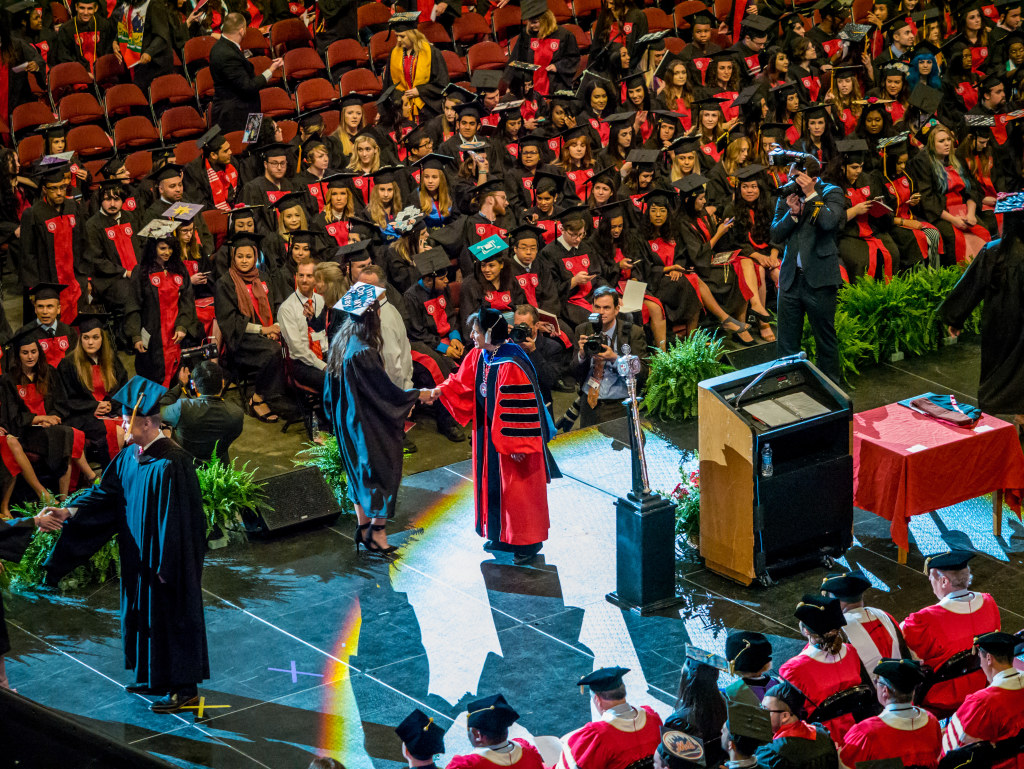
“She’s done a tremendous job making sure that we have a diverse community,” he says. “When I was a student, Montclair State was not a diverse place. And now it is.”
Top Priority: Student Success
When pressed on what makes her most proud, Cole points to University Commencements and the student success they represent. “I see every year as the students walk across the stage there are more of them, from more programs, from more colleges. There are thousands and thousands and tens of thousands of souls that we have served.”
The other proud accomplishment is her longevity in the job. Among college presidents, 23 years is a long time at one institution, as many make their way to the next job after five or six years. But Cole says she wanted to make a real difference at Montclair State – for the sake of the students.
The recognition that students needed to be “front and center of everything that we did” began as soon as Cole arrived, recalls Pennington.
“For many years, a byword that she would always bring into every meeting we had was retention, not just enrollment, but more importantly, retention and graduation,” Pennington says. “That allowed those of us in support positions to place the emphasis where it needed to be, which was on what it takes to help a student succeed and the things we need to ensure that they get to make that happen.”
Cindy Meneghin, director of Student Communications and chair of the President’s Commission on Affirmative Action, Equal Opportunity and Diversity, adds, “Everything Dr. Cole has done and everything she’s doing and everything she wants us to do is about the students. It’s about keeping the talent in New Jersey. It’s about making sure everybody who wants a seat in the classroom, gets a seat, helping them grow as people, as good citizens, as not just well-educated, but well-informed and involved. She wants the students to grow as people here.”
Under Cole’s leadership, research-scholars continually break records for securing external grant funding, with $22.4 million awarded for the fiscal year 2020 alone. Thanks to their work, in 2017, the State of New Jersey designated Montclair State a New Jersey Public Research University, and in 2019, the University advanced in its Carnegie Classification to R2, Doctoral University.
‘Turning Straw Into Gold’
Remaining affordable and accessible remain core values for the University. To support its commitment, Montclair State has consistently maintained tuition rates among the lowest of the four-year public colleges and universities in the state, and dramatically increased scholarship funding.
Keeping tuition rates low has been challenging in a state that historically does not provide much funding for higher education. In a 100-year history of the institution, Montclair State University: A Century of Triumph Over Circumstance written by Professor Emeritus Joseph Thomas Moore, Cole said that in order to provide the buildings and the faculty needed, “we have taken matters into our own hands; we have been aggressive and entrepreneurial and clever about turning straw into gold.”
“Everything Dr. Cole has done and everything she’s doing and everything she wants us to do is about the students.”
Cole has taken on educating New Jersey lawmakers. Trustee Rose Cali recalls accompanying Cole to Trenton for innumerable meetings with state university and political leaders. Cali says she sometimes questioned whether they had accomplished anything at a meeting, but Cole was stalwart.
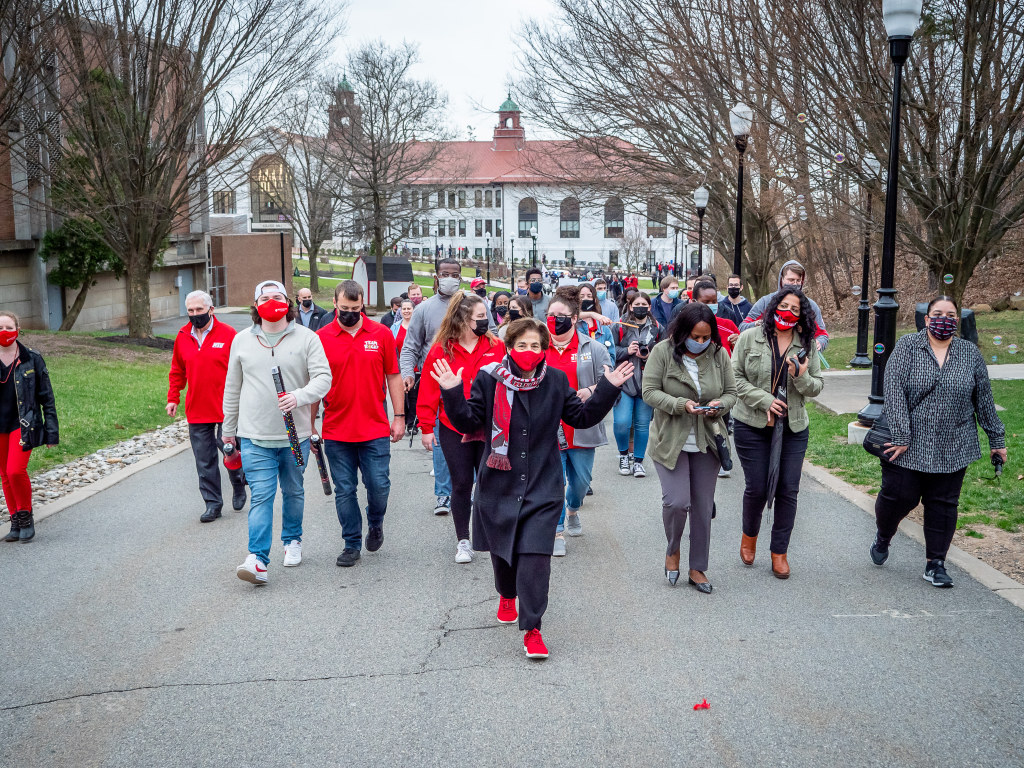
“She has clarity in vision,” Cali says. “She saw the broader content and context in working with the state. With her fellow presidents throughout the state, she was the leader.”
Senator Weinberg explains that Cole “made her impact on the college funding formula, not necessarily on the dollars that came forth from that formula, but to make the formula more equitable. Susan gave me a much more passionate view. It’s not just lines on a paper because she made it come alive.”
Case in point, the public-private partnerships to build residence halls and outfit other facilities. “The best examples of that were the dorms and the way President Cole navigated her way through the political system to make sure that she was able to construct those and change the campus from one that was mostly commuters, to one where there’s actually a student environment on campus now,” LaRossa adds.
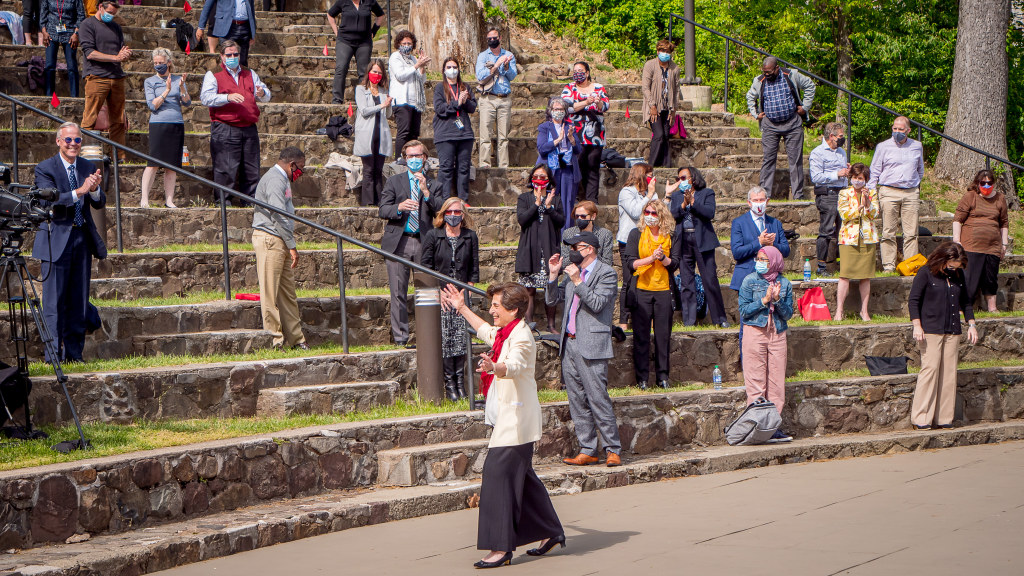
Final Bow
In her fall address on September 9, 2020, her last to open an academic year, Cole said: “I will not tell you, as so many people do when they retire, that it is time to retire because I have accomplished what I came to do. It would not be true. The University is not finished, and I have not accomplished all that I came to do. The University will never be finished; it is organic and ever changing and meant for the ages, not just the decades. … I am not finished, I could never be finished, so, at some point, I just have to stop.”
In a recent interview, Cole said it’s time for someone with fresh eyes to look at the future. The University has hired Jonathan G.S. Koppell to succeed Cole as the University’s ninth president (see University Names Next President).
The foundation that Cole laid will serve the University as it continues to grow. And, to ensure that her legacy serves students well into the future, donors recently contributed approximately $3.5 million in her honor to benefit students and programs across the University, including a scholarship in her name. The President Susan A. Cole Scholarship will ensure that New Jersey students who strive to achieve educational success have the opportunity for an education at Montclair State despite any economic and social challenges they may face.
“The University will never be finished. … I am not finished, I could never be finished, so, at some point, I just have to stop.”
After nearly a quarter century dedicated to building and running the University, Cole says she plans to live in a completely different way in retirement – to take the time to walk, to see and to write.
“I’ve been working ever since I was a little girl helping my parents in their picture frame shop in Brooklyn. I’ve never not had a job, and my life has been consumed with family and working, and when I work, I work full out, it’s never halfway.”
That family includes her two children, Simon and Alexa. Simon Cole is a professor of Criminology, Law and Society, and director of the Newkirk Center for Science and Society at the University of California, Irvine. Alexa Cole is acting deputy assistant secretary for International Fisheries and director of the Office of International Affairs for the National Oceanic and Atmospheric Administration Fisheries. Cole also has two granddaughters, Sonia, a senior working on a joint degree in History from the College of William & Mary and St. Andrews University in Scotland; and Leah, a senior soccer player at Irvine High School. Cole’s husband of 37 years, the visual artist David Cole, died in 2000.
As Cole shared recently with the Cali School choral music students, “When I retire this summer, that’s when I’ll try and get some balance back. I’ve been working for a very long time, and now it’s time to be Susan and find myself again, outside of the context of work.”